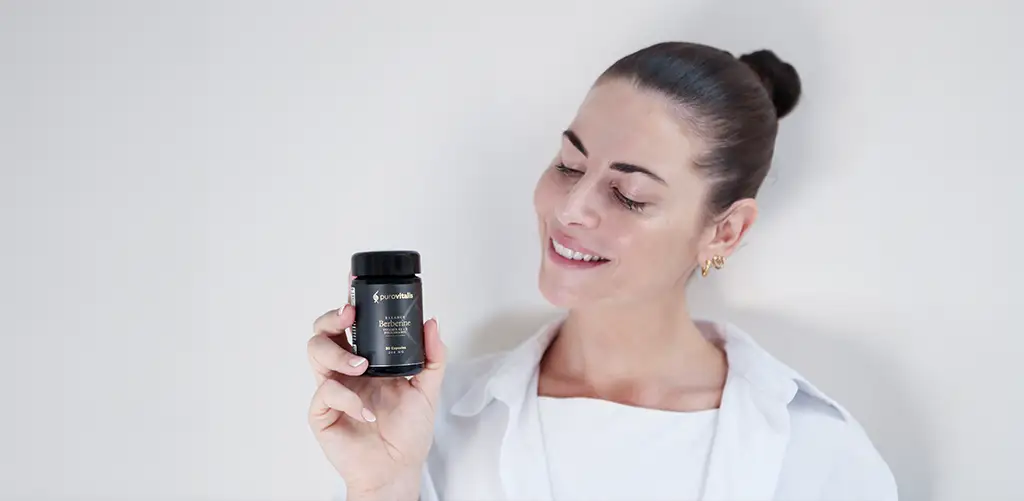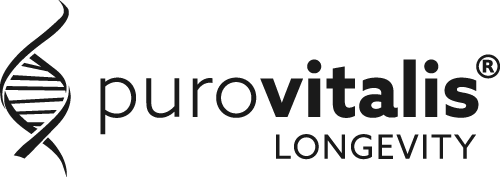
table of contents
“Polycystic ovary syndrome (PCOS) affects an estimated 6–13% of women of reproductive age, and up to 70% of cases are undiagnosed.”
– WHO, 2023
Polycystic ovary syndrome (PCOS) affects millions of women worldwide. It can cause irregular cycles, weight gain, fertility challenges, and metabolic issues. While lifestyle changes and medications like metformin remain common approaches, more women are exploring natural support. One supplement that has gained attention is berberine — a plant compound studied for its effects on both metabolism and hormones.
In this blog, we’ll explore what PCOS is, how berberine may support women with PCOS and other reproductive issues, and what the science says about its effects on hormones, cycles, ovulation, and menopause.
What is PCOS – the hormonal background
PCOS develops when the balance of reproductive hormones is disrupted. High insulin levels and insulin resistance push up androgens, which disturb ovulation and cycle regularity [1].
What are Androgens?
Androgens are male-hormones like testosterone. Women produce them too, but in PCOS levels can be higher than normal, causing acne, irregular periods, and unwanted hair growth.
Beyond these visible symptoms, PCOS can affect many parts of health. Women often struggle with irregular or absent ovulation, which can make getting pregnant difficult. The excess androgens can also impact skin and hair, while insulin resistance raises long-term risks of type 2 diabetes and cardiovascular disease.
International guidelines updated in 2023 emphasize that PCOS is not only a fertility problem — it is a complex condition that can influence metabolism, mental health, and overall well-being [2].
PCOS and berberine
Berberine is a natural compound found in plants such as barberry and coptis. Traditionally used in Chinese medicine, it activates an enzyme called AMPK, which helps regulate blood sugar and metabolism [3].
Recent research has linked berberine and PCOS in several important ways:
- Improved menstrual regularity: A 2023 randomized controlled trial of 130 women with PCOS found that after 90 days, nearly 70% of those taking berberine had regular periods, compared to just 16% in the control group [4].
- Better fertility outcomes: A 2024 meta-analysis reported that berberine supplementation improved ovulation and pregnancy rates in women with PCOS-related infertility, alongside reductions in testosterone [5].
- Metabolic support: Berberine consistently improves insulin sensitivity and cholesterol, which are major challenges in PCOS [6,7].
Summary
Berberine seems to work on two fronts: balancing metabolism and supporting reproductive health. That dual effect makes it especially relevant for PCOS.
Related: Berberine vs Inositol: What are the main differences?
Berberine and reproductive hormones
A frequent question is: does berberine increase estrogen? Current evidence shows berberine does not directly raise estrogen, but han an effect in overall hormone balance.
- Reviews from 2024 highlight reductions in testosterone and free androgen index, and increases in SHBG [8].
- Some studies also suggest that berberine may help increase progesterone, the hormone that rises after ovulation and prepares the body for pregnancy. Higher progesterone levels are important for keeping cycles more regular, so this effect could help women with PCOS experience more predictable periods.
What is SHBG (sex hormone-binding globulin)
SHBG is a protein that carries hormones like testosterone and estrogen. By binding to them, it reduces how much is free and active. Low SHBG means more free testosterone, which can worsen PCOS symptoms such as acne and excess hair growth.
Berberine and period issues
PCOS often brings irregular or heavy periods, sometimes with cramps. The 2023 RCT found that berberine use led to significantly more women reporting normalized cycles after three months [4]. While evidence for pain relief is limited, better hormonal balance may reduce symptoms like heavy bleeding or discomfort over time.
Summary
Berberine and your period are linked through hormones: by improving insulin sensitivity and reducing excess androgens, berberine may help cycles become more regular and manageable.
You might also find this blog interesting: Does Berberine help with weight loss?
Berberine and ovulation
One of the biggest goals in PCOS treatment is restoring ovulation. Ovulation is the monthly release of an egg from the ovary, which makes pregnancy possible. In women with PCOS, ovulation often doesn’t happen regularly, which is why cycles can be unpredictable and fertility is affected.
A 2024 meta-analysis found that women with PCOS taking berberine were more likely to ovulate and achieve pregnancy compared to controls [5]. This aligns with earlier findings but gives more up-to-date confirmation that berberine may be a useful tool for women trying to become pregnant.
Berberine and menopause
Berberine is not only being studied in PCOS. In postmenopausal women, it has been shown to improve cholesterol, triglycerides, and blood sugar control [9].
While some ask does berberine cause hot flashes? — current studies do not suggest that. Instead, by improving metabolic balance, berberine may help reduce risks that increase after menopause, such as cardiovascular disease.
Related: Berberine guide: Benefits, side effects, and dosage
Best berberine for reproductive health?
Most clinical studies use around 500 mg, taken two or three times a day [7]. But the dose is only part of the picture — what really matters is that the supplement is pure, tested, and made to be absorbed properly. Otherwise, you may not get the same effects that show up in research.
That’s why Purovitalis developed Berberine Balance with dihydroberberine, a form shown to be absorbed much better than standard berberine. It stays longer in the body, which means you can take a lower dose while still getting clinically relevant effects. Added ingredients like vitamin K2, vitamin E, policosanol, and chromium provide extra support for blood sugar, cardiovascular health, and hormone balance.
At Purovitalis, that’s the approach behind Berberine Balance: clean ingredients, careful testing, and quality standards that match what the science is based on.
Read more about dihydroberberine here: What is Dihydroberberine?
References
- Lizneva D, Suturina L, Walker W, Brakta S, Gavrilova-Jordan L, Azziz R. Criteria, prevalence, and phenotypes of polycystic ovary syndrome. Fertil Steril. 2016;106(1):6–15.
- Monash University. International evidence-based guideline for the assessment and management of polycystic ovary syndrome. 2023.
- Turner N, Li JY, Gosby A, To SWC, Cheng Z, Miyoshi H, et al. Berberine and its effects on metabolic regulation. Diabetes. 2008;57(5):1414–21.
- Di Pierro F, Villanova N, Agostini F, Soverini V, Prisco D. Berberine phytosome in PCOS: effects on menstrual regularity and clinical features. Front Pharmacol. 2023;14:1139810.
- Sun Y, Zhang Y, Chen R, Wang X, Li X. Berberine supplementation improves fertility outcomes in women with PCOS: a meta-analysis of randomized controlled trials. Reprod Biomed Online. 2024;58(3):312–22.
- Sahebkar A, Serban C, Ursoniu S, Banach M. Effects of berberine on glucose metabolism and lipid profile: a systematic review and meta-analysis of randomized controlled trials. Front Pharmacol. 2021;12:653131.
- Chawla S, Sharma D, Singh S, Banerjee BD, Arora SK. Randomized controlled trial of HIMABERB® berberine in prediabetes: effects on glucose and insulin. BMC Endocr Disord. 2023;23:109.
- Krzyczkowska-Sendrakowska M, Szubert M, Czyzyk A. Berberine and polycystic ovary syndrome: a knowledge summary. Ginekol Pol. 2024;95(4):256–62.
- Cicero AFG, Colletti A, Bajraktari G, Descamps O, Djuric DM, Ezhov M, et al. Lipid-lowering nutraceuticals in clinical practice: position paper from an international expert panel. Nutrients. 2025;17(2):335.

Berberine Balance protects heart optimizes metabolism Blood Sugar Control
While regular Berberine gets the job done, Dihydroberberine does it better, faster, and longer. Try it out!













